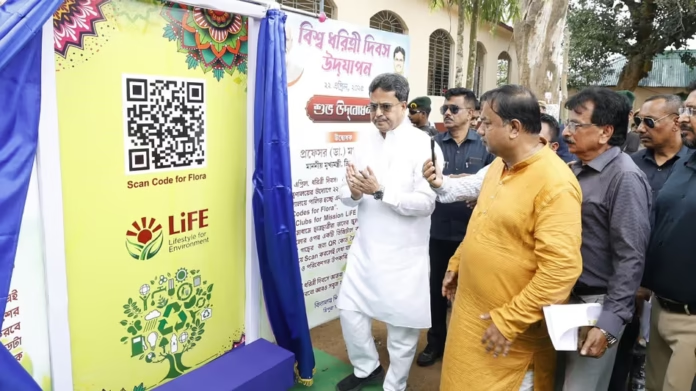Tripura Chief Minister Manik Saha on April 22 launched a unique and environment-friendly initiative aimed at spreading awareness among students by introducing detailed QR codes on the flora around school campuses. The state government unveiled the project at Amtali Higher Secondary School in West Tripura district on Earth Day, aligning with the global call for action to protect the environment.
The initiative marked a significant step in combining education with environmental consciousness. Officials placed QR codes on various trees and plants within the school campus, allowing students to scan them using smartphones. The QR codes provided scientific and common names of the plants, details about their medicinal properties, ecological importance, and information on how they support biodiversity.
Chief Minister Saha emphasized that the program was not just symbolic but deeply rooted in the state’s efforts to foster practical knowledge among schoolchildren. He said that by combining digital tools with real-world biodiversity, students would gain a hands-on understanding of nature. He asserted that this would encourage them to take personal responsibility in protecting the environment. He added that future generations must not only learn about sustainability in textbooks but also experience it in everyday life.
The Chief Minister also highlighted the larger education infrastructure development strategy under which the QR code initiative was launched. He noted that the state had been investing heavily in modernizing schools with digital tools, new buildings, and updated learning environments. He said the goal was to ensure that the education system in Tripura kept pace with global standards while reflecting local needs and ecological context.
Environment and Forest Department officials collaborated closely with the Education Department to bring the project to life. A team of environmental scientists and educators curated the information embedded in the QR codes. They selected plant species that were locally relevant, both in terms of ecological value and cultural importance, ensuring that students learned about trees native to Tripura’s landscape.
During the launch event, students of Amtali Higher Secondary School participated in a guided activity where they explored the campus and used the QR codes to identify different plant species. Teachers praised the program for making learning interactive and said that the excitement among students was visible. One biology teacher described the initiative as a “game changer” for experiential education.
The state government plans to expand the QR code program to more schools across districts in the coming months. Officials are currently preparing to implement similar installations in at least 50 government schools by the end of the year. The government has allocated a dedicated budget under the education and environment sectors for this initiative. CM Saha confirmed that the state would continue to invest in such innovative educational methods.
Tripura has recently taken several steps to integrate environmental education into the formal curriculum. These include plantation drives by schoolchildren, eco-club formations, and competitions that promote knowledge of sustainable living practices. With this new initiative, the state has combined its digital drive with its environmental agenda, signaling a more future-ready education policy.
While addressing the gathering at the launch, CM Saha also urged other northeastern states to take similar measures. He emphasized that children across the region needed to be empowered with information and tools to understand the environment. He added that only a region-wide approach could create a generation that respects nature and acts to conserve it.
Local environmental activists have lauded the program and said that this was a constructive way of bringing students closer to the ecosystem they live in. One noted that students who grow up with this awareness are more likely to become advocates for the environment as adults.
As the QR code initiative continues to unfold, Tripura’s approach serves as an example of how technology can work hand-in-hand with environmental education. By empowering students with accessible and engaging information, the state has taken a meaningful step toward shaping responsible citizens of tomorrow.
Read more about how Tripura’s new initiative to stay updated.


